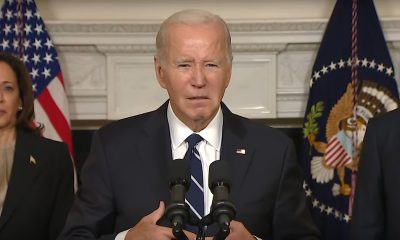National
Gay advocates assail Obama’s Justice Department
Claim administration misrepresented views in ‘Don’t Ask’ brief
Experts on “Don’t Ask, Don’t Tell” are lambasting the Justice Department, claiming the administration misrepresented their views in a legal brief aimed at thwarting a court challenge to the ban on open service.
Nathaniel Frank, a senior fellow at the Palm Center, a think tank at the University of California, Santa Barbara, said the Obama administration mischaracterized his views on the impact that open service would have on privacy issues.
“The way they portrayed me is preposterous and I’m not sure that any person in good faith hearing what I had to say could conclude what the [Department of Justice] concluded in their [request for] summary judgment,” he said. “I specifically said having a concern about privacy is not irrational, but using that privacy concern as an argument for the need to ban gays is irrational.”
Aaron Belkin, director of the Palm Center, similarly claimed the Justice Department misrepresented what he said in depositions about privacy arguments, and even went so far as to say the Obama administration lawyers weren’t being truthful.
“They completely misrepresented my statement in the deposition,” Belkin said. “They were not being truthful about my statement because they said that I claimed that there is a rational basis for the privacy arguments, and I claimed no such thing.”
In a request for summary judgment released earlier this week, the Justice Department names Frank and Belkin as among the experts on “Don’t Ask, Don’t Tell” who gave depositions in the case of Log Cabin v. United States. The lawsuit seeks to overturn the ban on the basis that it infringes upon the First Amendment rights of LGBT service members.
Both Frank and Belkin were questioned during deposition about whether privacy concerns for service members constituted a rational basis for the enactment of “Don’t Ask, Don’t Tell” in 1993.
The brief says Frank “acknowledged” during his deposition that “privacy concerns such as those on which Congress relied were not irrational.” But Frank disputed this characterization, pointing to his remarks during deposition.
According to an excerpt of the deposition obtained by DC Agenda, Frank was asked about privacy issues in the context of whether former Chairman of the Joint Chiefs of Staff Gen. Colin Powell’s statement in 1993 that service members “are required to live in communal settings that force intimacy and provide little privacy” was based on professional military judgment.
Frank replied that Powell — whose position has since evolved to endorse the Pentagon’s process for repealing the law — may have had concerns with privacy as a general matter based on professional judgment, but said Powell’s statement doesn’t “constitute an argument for keeping out open homosexuals.”
“Because what he says here is that service members are required to serve with very little privacy, so it doesn’t make any sense to me to conclude from that that there is a justification to exclude open homosexuals since he’s just acknowledged that part of being in the military means sacrificing privacy,” Frank said in his deposition.
It’s for this reason that Frank is now saying the Justice Department misrepresented his views in the brief against the lawsuit.
“So I really said the opposite of what the DOJ motion claims,” he said. “I made very clear that I would not call those feelings [about privacy] irrational, but nor would I call it rational to use that feeling as a legitimate basis for excluding a whole group of people. And that’s all there in the record.”
Belkin similarly cried foul, claiming the Justice Department mischaracterized his deposition in the brief. The administration says that Belkin testified that “the privacy basis is rational in circumstances such as combat where private accommodations are not possible.”
“Dr. Belkin studied the experience of the Israeli military and found that heterosexual concern about privacy necessitated, in certain instances, separate accommodations or work arrangements for heterosexual service members,” says the brief. “Dr. Belkin also acknowledged similar findings with respect to Congress’ concern regarding sexual tension within the military.”
According to the brief, Belkin also “pointedly admitted” people in the military have sex with each other, and some service members have “sex with other members of the same sex.”
But Belkin said the Justice Department’s account of his deposition and his alleged acknowledgement of a rational basis for privacy concerns was completely off the mark.
“People who defend ‘Don’t Ask, Don’t Tell’ for almost 20 years have been confusing up with down and left with right,” he said. “If the Obama administration lawyers think that my remarks in any way constitute an acknowledgement of the rational basis for the privacy rationale, then they need a new legal team.”
Belkin said the Justice Department neglected to mention major points about his deposition. He said he brought up men having sex with other men because he believes straight men would be having sex with men in the military regardless of the ban.
“Think for a minute about prisons,” he said. “It’s not exactly the same, but the point is not that gays are responsible for gay sex, but a lot of people have same-sex sex in the military and the privacy rationale does not take that into account. The privacy rationale is premised on the assumption that it’s only gays who having sex, so you have to get rid of the gays if you want to get rid of that kind of thing.”
Belkin also said the Justice Department misconstrued his take on there being a rational basis for “Don’t Ask, Don’t Tell” because some straight service members are uncomfortable around gay service members.
“It’s absolutely true that some heterosexual service members are uncomfortable in front of gay service members, but that in no way constitutes a rational basis for the privacy rationale because gays and lesbians are already serving with straight service members — and the conditions in the barracks and the showers are not going to change after the repeal of the ban,” he said.
The Justice Department didn’t respond to a request for comment on Frank and Belkin’s assertions that they were mischaracterized in the brief.
Frank also took issue with the Justice Department’s repeated references to experts on “Don’t Ask, Don’t Tell” with the use of quotation marks.
For example, the brief says in a footnote that “LCR’s ‘experts’ ultimately seek to challenge the wisdom of the DADT policy, a challenge that is irrelevant under rational basis review.”
Frank said the repeated reference to experts in quotation marks is “highly unusual” for the Justice Department and “may have gone too far.”
“That’s a favorite tactic of the religious right to polish their anti-intellectual credentials, and make it seem like there’s no such things as a homosexual, so they’ll put homosexual in quotes,” he said.
The Obama administration defense of the “Don’t Ask, Don’t Tell” statute against the challenge from Log Cabin is causing consternation among advocacy groups seeking to repeal the law.
Joe Solmonese, president of the Human Rights Campaign, said “we took a step backward” with the Justice Department brief in the move to repeal “Don’t Ask, Don’t Tell” and that the brief “relies on arguments that were debunked and discredited in 1993, and even more so now.”
Solmonese also called on the administration to “show leadership, move the debate forward, and work with Congress to get repeal done” this year.
“While the Pentagon undertakes its review of how to implement repeal, Congress can and must move forward in repealing DADT in the same bill that put it into law more than 17 years ago — the defense authorization act,” he said. “And the president can and must provide the leadership necessary to get the law passed this year.”
Aubrey Sarvis, executive director of the Servicemembers Legal Defense Network, expressed similar disappointment in a statement responding to the brief.
“SLDN understands the Justice Department’s role in defending the constitutionality of federal laws, even ones with which its leaders do not agree,” Sarvis said. “However, there continues to be a big and unnecessary disconnect between what DOJ files in court and what the president says on Capitol Hill and to his top [Department of Defense] leadership team.”
Sarvis said he wants the White House to make clear to Congress that “Don’t Ask, Don’t Tell” is a priority this year for President Obama and for the president to include repeal language in budget language headed to Capitol Hill in the coming weeks.
“The president’s defense budget repeal language should mirror the words in his State of the Union speech to Congress and the American people,” Sarvis said.
In a statement, Tracy Schmaler, spokesperson for the Justice Department, said the administration is defending “Don’t Ask, Don’t Tell” as “it traditionally does when acts of Congress are challenged.”
“The department does not pick and choose which federal laws it will defend based on any one administration’s policy preferences,” she said.
Schmaler said Obama disagrees with the underlying judgments Congress used to pass “Don’t Ask, Don’t Tell,” and noted that the president “believes and has repeatedly affirmed that [‘Don’t Ask, Don’t Tell’] is a bad policy that harms our national security and undermines our military effectiveness.”
“The president and his administration are working with the military leadership and Congress to repeal this discriminatory [law],” she said.
National
House Republicans propose steep cuts in federal AIDS budget
Advocacy groups say move would eliminate ‘Ending HIV Epidemic’ initiative

The Republican-controlled U.S. House Subcommittee on Labor, Health, and Human Services, Education, and Related Agencies approved a spending bill on June 26 that calls for cutting at least $419 million from federal AIDS programs that AIDS activists say would have a devastating impact on efforts to greatly reduce the number of new HIV infections by 2030.
The subcommittee’s proposed bill, which includes billions of dollars in cuts in a wide range of other federal health, education, and human services related programs, is scheduled to be considered by the full House Appropriations Committee on July 10. Officials with AIDS advocacy groups say they are hopeful that the full committee, like last year, will refuse to approve the proposed cuts in the AIDS budget.
The proposed GOP cuts would eliminate $214 million from the U.S. Centers for Disease Control and Prevention’s HIV prevention programs, $190 million from the Ryan White HIV/AIDS Program, and $15 million from the Department of Health and Human Services Secretary’s Minority HIV/AIDS Program.
Activists say the impact of those cuts would kill the federal government’s Ending the HIV Epidemic initiative, which among other things, calls for reducing the number of new HIV infections in the U.S. by 75 percent by 2025 and by 90 percent by 2030. The activists point out that ironically the Ending the HIV Epidemic initiative was launched during the administration of President Donald Trump.
“Instead of providing new investments in ending HIV by increasing funding for testing, prevention programs, such as PrEP, and life-saving care and treatment, House Republicans are again choosing to go through a worthless exercise of cutting programs that the American people depend on and will never pass,” said Carl Schmid, executive director of the HIV + Hepatitis Policy Institute.
“While we vigorously fight these cuts, we look forward to working with the entire Congress in a bipartisan fashion on spending bills that can actually become law,” Schmid said in a statement.
Schmid noted that the bill also includes provisions known as “policy riders” that would take away rights and protections from women, such as access to birth control and abortion, and for minorities, including LGBTQ people.
According to a statement released by the office of Rep. Rosa DeLauro (D-Conn.), who is the ranking minority member of the House Appropriations Committee, one of the policy riders would “block the Biden administration’s policies to ensure nondiscrimination on the basis of gender identity and sexual orientation.’ The statement says another policy rider would “prevent policies or programs intended to promote diversity, equality, or inclusion.”
Most political observers believe the Democratic-controlled U.S. Senate would also kill the GOP proposed policy riders and cuts in the AIDS budget if the full Republican-controlled House were to approve the budget bill passed by the appropriations subcommittee.
Rep, Tom Cole (R-Okla.), who serves as chair of the full House Appropriations Committee, released a statement on June 27 defending the subcommittee’s bill and its proposed spending cuts. “The bill provides appropriate and fiscally responsible funding to ensure these departments can continue to perform their core missions while also acknowledging the fiscal realities facing our nation,” he said.
“Importantly, the bill pushes back on the Biden administration’s out-of-touch progressive policy agenda, preventing this White House from finalizing or implementing controversial rules or executive orders,” Cole said in his statement. “It also preserves long standing bipartisan policy provisions protecting the right to life.”
U.S. Supreme Court
Concern over marriage equality in US grows two decades after first Mass. same-sex weddings
Gay and lesbian couples began to marry in Bay State in 2004

Two decades after Massachusetts became the first state to legalize same-sex marriage, a new study reveals both significant progress and ongoing challenges for married LGBTQ couples in the U.S., with a growing sense of insecurity about the future of their rights.
The Williams Institute at UCLA School of Law surveyed 484 married same-sex couples from all 50 states and D.C. The study, released Monday, marks the 20th anniversary of legal same-sex marriage in the U.S.
Researchers found that 93 percent of respondents cited love as a primary reason for marrying, with 75 percent also mentioning legal protections. Over 83 percent reported positive changes in their sense of security, and 74.6 percent noted improved life satisfaction since marrying.
However, the study also highlighted persistent discrimination and growing concerns about the future. About 11 percent of couples who had a wedding reported facing prejudice during the planning process.
Alarmingly, nearly 80 percent of respondents expressed concern about the potential overturning of the 2015 Obergefell v. Hodges decision, which legalized same-sex marriage nationwide. This anxiety has been exacerbated by initiatives like Project 2025, a conservative policy blueprint that some fear could roll back LGBTQ rights if implemented.
The possibility of a former President Donald Trump victory in the upcoming election has further intensified these concerns. Many respondents cited Trump’s previous U.S. Supreme Court appointments and his statements on LGBTQ issues as reasons for their apprehension. One participant stated, “The thought of another Trump presidency keeps me up at night. We’ve come so far, but it feels like our rights could be stripped away at any moment.”
The current political climate has 29 percent of respondents considering moving to another state, with 52.9 percent citing socio-political concerns as a primary reason. This reflects a growing sense of insecurity among LGBTQ couples about their rights and freedoms.
Brad Sears, founding executive director of the Williams Institute, noted, “The data clearly show that marriage equality has had a profound positive impact on same-sex couples and their families. However, it also reveals ongoing challenges and serious concerns about the future of these rights in light of current political trends and the upcoming election.”
Christy Mallory, legal director at the Williams Institute and lead author of the study, added, “This research provides crucial insights into the lived experiences of same-sex couples two decades after marriage equality began in the U.S. The high level of concern about potential loss of rights underscores the continued importance of legal protections and public support for LGBTQ+ equality.”
The study found that 30 percent of surveyed couples have children, with 58.1 percent of those parents reporting that marriage provided more stability for their families. However, many of these families now worry about the security of their legal status in the face of potential policy changes and shifting political landscapes.
As the nation reflects on two decades of marriage equality, the study underscores both the transformative power of legal recognition and the ongoing need for vigilance in protecting LGBTQ+ rights. The findings highlight the complex reality faced by same-sex couples in America today: Celebrating hard-won progress while grappling with uncertainty about the future, particularly in light of upcoming political events and potential shifts in leadership.
State Department
State Department hosts meeting on LGBTQ rights and foreign policy
Event took place before Pride Month reception

Secretary of State Antony Blinken on Thursday hosted a group of LGBTQ activists and politicians from around the world at the State Department.
The event — described as a “Convening on U.S. Foreign Policy: National Security, Inclusive Development, and the Human Rights of LGBTQI+ Persons” — took place before the State Department’s annual Pride Month reception. Participants included:
• Jessica Stern, the special U.S. envoy for the promotion of LGBTQ and intersex rights
• U.S. Ambassador to the U.N. Linda Thomas-Greenfield
• U.S. Trade Representative Katherine Tai
• U.S. Ambassador to India Eric Garcetti
• Suzanne Goldberg, senior advisor to the Under Secretary of State for Civil Security, Democracy, and Human Rights
• Under Secretary of State for Civilian Security, Democracy, and Human Rights Uzra Zeya
• U.S. Agency for International Development Senior LGBTQI+ Coordinator Jay Gilliam
• USAID Counselor Clinton D. White
• National Security Council Senior Director for Democracy and Human Rights Kelly Razzouk
• Assistant U.S. Secretary of Health Adm. Rachel Levine
• National Security Council Human Rights Director Jess Huber
• U.N. Assistant Secretary General for Human Rights Ilze Brandt Kehris
• Icelandic Ambassador to the U.S. Bergdís Ellertsdóttir
• Council for Global Equality Co-Executive Director Mark Bromley
• Outright International Senior Advisor for Global Intersex Rights Kimberly Zieselman
• Essy Adhiambo, executive director of the Institute for Equality and Non Discrimination in Kenya
• Pau González, co-chair of Hombres Trans Panamá and PFLAG-Panamá
“Forty-five years ago, thousands gathered in D.C. in what became the first national march for LGBTQI+, demanding their voices be heard,” said Thomas-Greenfield in a post to her X account that showed her speaking at the event. “We must continue to carry forward the spirit of these pioneers and fight for equal rights and dignity for all.”
Forty-five years ago, thousands gathered in DC in what became the first national march for LGBTQI+, demanding their voices be heard.
We must continue to carry forward the spirit of these pioneers and fight for equal rights and dignity for all. 🏳️🌈🏳️⚧️ pic.twitter.com/oph2Ahmfhq
— Ambassador Linda Thomas-Greenfield (@USAmbUN) June 28, 2024
President Joe Biden in 2021 signed a memo that committed the U.S. to promoting LGBTQ and intersex rights abroad as part of his administration’s overall foreign policy.
“LGBTQI+ rights are human rights,” said Blinken. “Our government has a responsibility to defend them, to promote them — here and everywhere.”
Blinken noted consensual same-sex sexual relations remain criminalized in 64 countries, with the death penalty in 11 of them.
He specifically highlighted Uganda’s Anti-Homosexuality Act and Hungarian Prime Minister Viktor Orbán’s government’s “smearing scapegoating, stigmatizing LGBTQI+ persons — vilifying them with degrading labels, denying them equal rights, normalizing violence against them.” (Gay U.S. Ambassador to Hungary David Pressman this month marched in the annual Budapest Pride parade.)
Blinken noted Iraqi MPs earlier this year “passed legislation that punishes same-sex relations with up to 15 years in prison.” He also pointed out that Indonesian lawmakers approved a new criminal code banning extramarital sex.
“In a nation where same-sex couples cannot marry, these laws effectively make all same-sex conduct illegal and they undermine privacy for all Indonesians,” said Blinken.
“We’re defending and promoting LGBTQI+ rights around the world,” he said.
Blinken noted seven countries — Barbados, St. Kitts and Nevis, Antigua and Barbuda, Dominica, Namibia, Singapore, the Cook Islands — have decriminalized consensual same-sex sexual relations over the last two years. He also highlighted Greece, Liechtenstein, and Thailand this year extended marriage rights to same-sex couples, and other countries are banning so-called “conversion therapy.”
“These achievements are possible because of incredibly courageous human rights defenders and government partners on the ground, but I believe America’s support is indispensable,” said Blinken. “When we engage — sometimes publicly, sometimes privately, sometimes both — when we share our own knowledge and experience, we can and we do achieve change.”
Blinken also announced the U.S. now considers sexual orientation and gender identity are part of the International Covenant on Civil and Political Rights that took effect in 1976.
“This is one of the key treaties committing nations to upholding universal rights,” he said.
“In our regular reporting to the council on human rights, we will continue to include incidents of discrimination or abuse committed against LGBTQI+ persons, now with the clear framework of this well-supported interpretation,” added Blinken. “That will further empower our efforts.”
Blinken reiterated this point and the Biden-Harris administration’s commitment to the promotion of LGBTQ and intersex rights abroad when he spoke at the State Department’s Pride Month event.
“Defending, promoting LGBTQI+ rights globally is the right thing to do, but beyond that, it’s the smart and necessary thing to do for our country, for our national security, for our well-being,” he said.
-

 Canada2 days ago
Canada2 days agoToronto Pride parade cancelled after pro-Palestinian protesters disrupt it
-

 Theater5 days ago
Theater5 days agoStephen Mark Lukas makes sublime turn in ‘Funny Girl’
-

 Baltimore4 days ago
Baltimore4 days agoDespite record crowds, Baltimore Pride’s LGBTQ critics say organizers dropped the ball
-

 Sports4 days ago
Sports4 days agoHaters troll official Olympics Instagram for celebrating gay athlete and boyfriend












